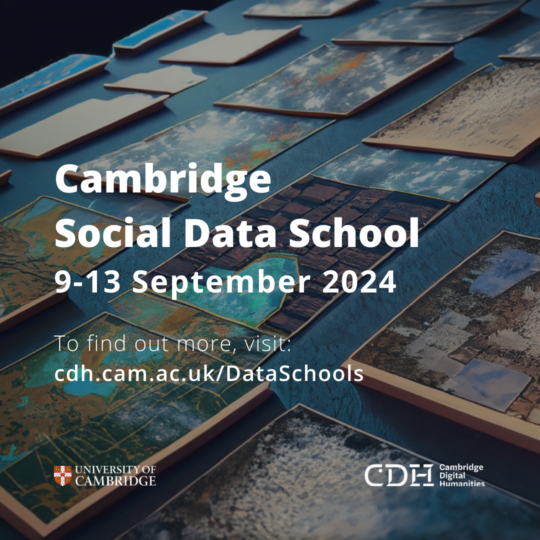| 4 Jun 2014 | 11:30am - 3:30pm | Room S3, Alison Richard Building | |
- Description
- Programme
Description
A Digital Methods Development Workshop organised by Cambridge Digital Humanities Network and Cambridge Conservation Initiative.
Guest speaker: Matthias Stevens (Extreme Citizen Science research group (ExCiteS), University College London)
Researchers in wide range of academic disciplines have begun to experiment with ‘crowdsourcing’ – creating or mobilising online communities of volunteers to assist them in their research by undertaking tasks which computers cannot yet do effectively (such as pattern recognition or reading handwriting) on a scale which research institutions will not fund by employing professionals to carry out the same task. The scale of public participation in such academic research projects using crowdsourcing methods is impressively large. The Zooniverse projects have more than 1 million registered users, (www.zooniverse.org), while the pioneering game Foldit, where participants play with digital models of proteins, has more than 300,000.
Meanwhile, recent developments in data collection tools and interfaces are also enabling experimentation with participatory data collection in a wide variety of settings from surveying house spiders in the UK using a smart phone app to participatory mapping for forest management in the Republic of the Congo by the ExCiteS project at UCL.
This workshop will explore the common ground between projects which depend on digital tools to enable participatory data collection and processing, and will share insights between researchers from a variety of different disciplines in areas such as:
- Understanding participants’ motivations
- Community engagement and training protocols
- Design of interfaces and tools
- Usability evaluation
Please click the tab above to see a programme of the workshop. The workshop is open to staff and graduate students at the University of Cambridge and the Cambridge Conservation Initiative partner organisations. If you would like to apply for a place, please email Anne Alexander (raa43@cam.ac.uk) (Researchers) or Elizabeth Allen (e.allen@jbs.cam.ac.uk) (CCI partner organisations), with a short statement stating why you are interested in attending, by 21 May 2014.
Programme
| 11.30-13.00 | Session 1: presentations by guest speakers Matthias Stevens (Extreme Citizen Science research group (ExCiteS), University College London) Nadia Pantidi (University of Nottingham) Matthias Stevens will report on the experience of his research team in designing and trying out data collection interfaces and protocols for non-literate users (in Central Africa) and how that has led them to develop a novel mobile data collection application (see http://sapelli.org) which they expect will be used in a wide range of other contexts as well. Part of their work is about learning how lessons from participatory mapping projects with non-literates lead to insights and tools that may be used in other contexts too. He will touch upon a range of different topics related to participatory data collection: introduction to the contexts in which our projects are set, the design of interfaces/tools, community engagement and training protocols, iterative improvement of interfaces, icon design choices and usability evaluation, Nadia Pantidi will speak on the work of her research team in developing a mobile app in collaboration with the New Forest National Park Authority and the University of Southampton, to assist biodiversity professionals in the surveying of the New Forest cicada lasted sighted in 2000. Some more information about this particular project can be found here: http://www.newforestcicada.info/. She will also discuss the findings of her research team in relation to developing general guidelines for designers of citizen science apps. |
| 13.00-13.45 | Lunch |
| 13.45-15.00 |
Session 2: case studies and small group work |





